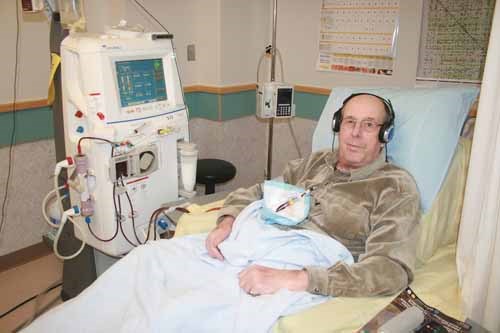For Don Harris trips to the hemodialysis unit at the Sunrise Health Centre in Yorkton has become part of the routine which keeps him active and alive.
Harris, 76, said he found out in 2004 he would need regular hemodialysis treatments.
"I had bladder cancer," he said, explaining "the cancer treatment damaged my kidneys."
The situation was one Harris, who shared his story to help raise awareness of the Kidney Foundation of Canada fundraising efforts in March, said he knew was a possibility.
"It's something that happens," he said, adding the treatments "killed the cancer because I don't any sign of that now, but it kills other stuff too."
Harris said the kidney damage wasn't immediate after the cancer treatments, but he began to feel ill early in 2004.
"I kind of didn't feel well," he said, adding he "ended up in Regina Hospital for three weeks," where testing found he was losing kidney function.
Initially doctors tried another treatment regime, but it didn't work, so "in June of that year they started dialysis," said Harris.
Research into hemodialysis and other treatments are part of what the KFC efforts help fund, said co-ordinator Ernest Heshka. The local canvas will take place March 17 - 21.
Heshka said in 2010, $12,500 was raised, and he hopes to be near that again, although he said they have fewer canvassers this year. In terms of donations, he said any amount helps.
"The 10s and 20s add up," he said.
Heshka said anyone wishing to help with the campaign can call him at 641-5965.
When Harris started his treatments he had to travel to Regina, making three trips a week. In the summer they drove, him driving down, his wife taking the wheel to come home.
In the winter, not wanting to chance bad weather they turned to the bus to make the trip.
The actual hemodialysis treatment takes 3.5 hours, but the trip to Regina meant leaving at 8 a.m. and not being back home until 9 p.m.Lorraine added traveling to Regina also made keeping to her husband's diet more difficult.
"You just can't eat anything. I used to pack a lunch we used to take with us," she said, adding the hospital cafeteria is even fast food which is high in sodium.
When additional hemodialysis units were added in Yorkton, and a third shift, Harris was able to have his treatments in the city, greatly lessening the time he has to devote to treatments.
There are currently 37 clients treated in Yorkton, receiving 108 treatments a week.
As for the actual hemodialysis treatment Harris said it's pretty easy on the body. In most cases they are connected to the unit through lines to veins in the arm, but in his case he is hooked up via lines to the chest.
Once connected, patients basically relax.
"You can go to sleep, or watch TV, or read," he said, adding he usually relaxes and catches a nap.
And recently, Harris has begun exercising as he takes his treatments. He explained his daughter Joanne, who works in the health field in Calgary told him about findings that exercising using a small stationary bike unit during treatments can be beneficial.
"We talked Yorkton into getting these bikes," he said, adding the small units are electronically assisted, but still exercises the legs.
The theory is they "get better treatments because the blood is circulating better," explained Lorraine.
The use of the bikes is so new the Harrises said they haven't had enough monthly blood tests to know if it's making a difference, but they do feel exercise is critical in maintaining the best health possible.
The most difficult part of needing hemodialysis is the fact you need to be at the hospital three times a week, said Harris, who added he hasn't been away from Yorkton in two or three years.
"That's the thing you're tied to home," he said.
Harris said he did go to Winnipeg for a funeral a few years ago, leaving on a Friday and not returning until late Monday.
"By then I was feeling it. At the end of the third day I started to feel it. I started to feel draggy," he said.
"Your toxins build up in the blood, that's basically what happens," added Lorraine.
Don said it is possible to arrange treatments in other centres with planning, although it's not easy. That was the situation in Winnipeg.
"We checked with Winnipeg but they couldn't accommodate us at the time," he said.
"You have to apply well in advance to make switches," added Lorraine.
Other than restricting travel, Harris said he tries to stay active. While he doesn't have the energy to hunt and golf, two past passions, he does other things.
"I can go fishing because it's fairly easy to just sit in a boat," he said. "And I still putter around the yard doing gardening, and mowing the lawn."




